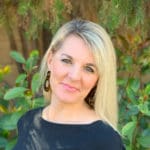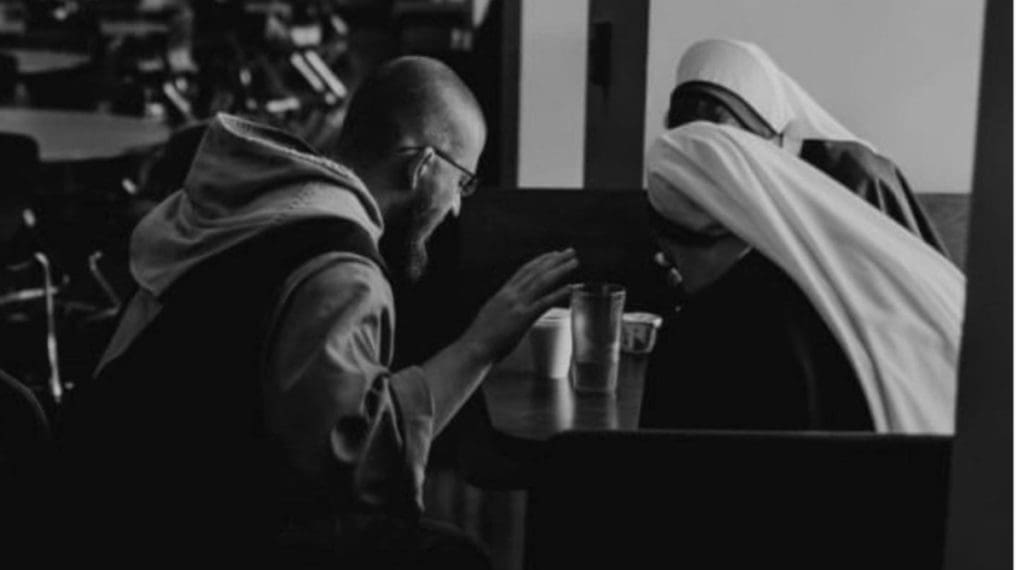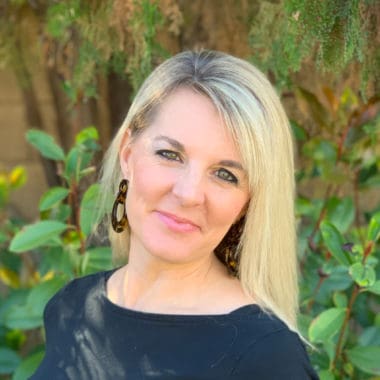I had the immense privilege recently of speaking with Fr. Mark-Mary Ames, CFR, director of communications for the Franciscan Friars of the Renewal, about his vocation story and the role that spiritual direction played on his journey to the priesthood. He discusses spiritual direction within the order, what it is and is not, and what we can do in the absence of regular spiritual direction.
Fr. Mark-Mary, will you tell us a little bit about yourself and your order?
Fr. Mark-Mary: Originally from southern California, I grew up Catholic, and was involved in youth ministry but only went all in for the Lord during my first year of college at Loyola Marymount.
I had my deeper conversion within the first couple of months of my freshman year. I was helping out on a youth retreat and heard someone speaking about Mother Teresa. It was just in passing, but I experienced this deep desire to give my life away to the poor and a realization that nothing else would satisfy me. I would say that is when I received my vocation to be a missionary.
Soon after, through learning about the sacraments, particularly the Eucharist and Confession, the desire to be a priest welled up. This all happened in the course of a few months. And then one day, after a young adult meeting, we were sitting at In-and-Out Burger and I heard about this group of Franciscans in New York who are hard-core and sleep on the ground.
To my 18-year-old sensibilities, that was the most “all in” way I’d heard to live the priesthood. I went home and looked up the Community of Franciscan Friars of the Renewal that night, read the constitutions, and there I saw all of my desires.
From there it was only a matter of seeing if the friars were who they said they were.
The Lord moved quickly in that season and made the end very clear, in part I think because getting there was going to be a little more difficult.
That clarity and conviction were graces; even in the distractions, I never doubted the call.
In the midst of my discernment, I remember going on a date with a girl and then coming home and watching a documentary on Pope John Paul II and being so moved with the desire to be a priest. I couldn’t deny it.
I later had a chance to go with a friend and teach for a year at a Zulu school in South Africa. That was an opportunity to see if this desire was, in fact, what I wanted to do with my life. It was–I was all in.
I was in touch enough with my deepest desires to know that this, really, was what I wanted.
When I returned from Africa, I contacted the CFRs. The Franciscan University of Steubenville was recommended as the next step. I learned so much at Franciscan University because I grew up in a home with sincerity but not a lot of catechesis and not much of an understanding of devotions—things like devotion to the Sacred Heart or Marian consecration, those I learned at Franciscan.
I graduated there at 24 years old and went on to join the friars.
Can you share with us the charism of the CFRs?
Fr. Mark-Mary: We started in 1987 in the South Bronx with eight founders who had all been Capuchins – Fr. Benedict Groeschel and Fr. Andrew Apostoli are some of the better knowns- but it was from the start a very diverse cast. (One of them was actually just ordained a bishop—Bishop Robert Lombardo of the Archdiocese of Chicago.)
Part of the genius and providence of this beginning was that they had to create a community that would fit all of these big, diverse personalities, and there is a health to our community now which is a fruit of that.
Our charism is, first of all, a mixture of communal and personal prayer that adds up to about four hours a day. We also have a retreat day which we call a prayer day, we have hermitage every month and a couple of retreats each year. We pray five times a day together, too, communally. So prayer is at the heart of it.
And then we take very seriously, maybe more than most, the fraternal life: we live together, work together, eat together, pray together.
It is from prayer and from fraternity that our external mission flows, which is evangelization and material assistance to the poor—soup kitchens, shelters, things like that.
Did you have the benefit of spiritual direction as you were discerning the priesthood and the CFRs?
Fr. Mark-Mary: I felt the desire to be a friar at 19 and I didn’t enter until I was 24. I didn’t have any spiritual direction for the first three years or so of that season. And I think that while the Lord provided, and it worked out, there’s no good explanation for why it did work out.
I didn’t have any direction. I didn’t have any mentoring. I didn’t have any background. A lot of it was just instinct, and the Lord simply providing.
In other words, spiritual direction wasn’t a part of my early discernment. Which was why mistakes happened that didn’t have to.
Were you aware that you could have had spiritual direction? Were you searching for a spiritual director? Did you know that there was such a thing?
Fr. Mark-Mary: I don’t know that I knew what it was. But even once I knew the concept, I still didn’t really understand it.
Because it can mean different things. There’s spiritual direction properly understood. You pray, bring your prayer to your spiritual director, and the two of you talk about what you see the Lord doing.
A lot of times now, we’ll use the term spiritual direction, basically to mean spiritual mentorship where we are bringing a lot more to the conversation.
When you were at the Franciscan University of Steubenville preparing for the priesthood, were you given a spiritual director for discernment purposes?
Fr. Mark-Mary: As part of the discernment program, guys were asked to get a spiritual director. But there were too few priests and too many students. It wasn’t deep, and it wasn’t particularly helpful. The priests themselves were not necessarily formed as spiritual directors, either. That can be another issue.
Since I’ve joined the Friars of the Renewal, we all have spiritual directors.
Are they always from within your community?
Fr. Mark-Mary: It’s up to the individual. There are specific members of the community that you cannot go to for direction because of their role in your life, and the need to protect the internal and external forum. So if you are in formation and there are people voting on you, they cannot be your spiritual director.
For the first couple years, as a postulant and novice, they are generally assigned to you. And then at some point, you can choose from an approved list.
Postulants now have a postulant director, a spiritual director, and also weekly spiritual mentorship as part of the eternal forum.
I am one of three friars who meet with postulants one-on-one for thirty minutes each week. This is so important for these men because they often don’t have experience in speaking about the interior life nor do they have experience in spiritual direction. As mentors, we are not only on their team, but we are asking them the right questions and helping them speak about the interior life and giving them input about what to bring and not bring to spiritual direction itself.
When you say ‘external forum’ do you mean that you are free to bring these conversations to the community as part of the two-way discernment process? So it is not as private and closed as spiritual direction?
Fr. Mark-Mary: Correct. So I can talk to Fr. Innocent, the postulant director, about what is or is not going well in these conversations—although we are not discussing it usually in the context of whether or not each man is a good fit with us. We are just wanting to love and care for him and prepare him no matter where he’s ultimately called.
What role does spiritual direction play in your life now, as a recipient?
Fr. Mark-Mary: I first went through five spiritual directors in five years after entering. They were all friars, and I wanted a friar because they knew the life so well. But then they would get moved to another country, or get elected Superior, or things like that.
To find some stability, I found a diocesan priest, and that’s who I have now. He went through IPF (The Institute for Priestly Formation) so he’s been trained in it. He’s in New York, so I go see him every month. Friars have a 48-hour personal retreat every month, which is very important to us, so when I make my personal retreat, I meet with him during that time. That’s not what every friar does.
Why is that monthly personal retreat such a priority for your order?
Fr. Mark-Mary: A lot of reasons. First of all, as Franciscans, we are religious. So our primary call is to contemplation and the interior life.
People might not think that when they meet you and see you among the poor on the streets.
Fr. Mark-Mary: Yes – but that’s something that is very clear in Vita Consecrata (the apostolic exhortation by Pope John Paul II on the consecrated life and its mission in the Church and the world). As consecrated men, the primary reason we exist is our interior relationship with the Lord. And that needs to be protected because the inertia of life will always be pulling us away.
We do live in the context of the world, and we are very apostolic-minded, so it is very easy if we are not careful, to become hyperactive at the cost of our interior life. And so the regular prayer helps and the monthly retreat helps us to not only rest but dust off the stuff of the world that may have crept in.
One of the reasons that I think people are more aware of spiritual direction now is that people are waking up to the fact that what you are describing in terms of your order, the contemplative core of the active life, is actually true for everybody.
There’s a deeper understanding that the fruit of everything we do comes from our relationship with God. Spiritual direction is a good way to keep us centered, keep us focused, keep us grounded in what is really at the heart of the spiritual journey: what God is doing in our prayer and the fact that everything else flows from that. I think we are collectively coming to an appreciation of the benefits of regular direction.
That said, what would you say to people searching for a spiritual director? Is it worth pursuing, especially if it has come to feel like an exercise in frustration?
Fr. Mark-Mary: It’s important for us to realize that in the year 2022 we are living, at least in the United States, in a very fractured society. If we were living in a different culture, we might have access to other resources and mentors. You’d have other people who know you and are mentors for you in whatever your state in life. Now we don’t have the benefit of a “personal team” to support us in the same way as it existed in the past.
But we are not meant to go through it alone. And that’s a real struggle of modern men and women who are trying to follow the Lord.
I mention this because sometimes when people come to spiritual direction, what they are really looking for is someone else to be on their team, who they trust, who is like-minded, who can help speak into their life—but the reality is that the demand for spiritual direction is much greater than the supply.
I am a sort of digital porter for our community because I run the communications, and so I receive frequent requests for spiritual direction from the friars. We have to almost always say no. And that’s true of most priests and religious — there’s very few who have the capacity to take on more.
So what do we say about that? Well, the first thing I would say is, if you have a regular prayer life, a mentor who is ideally in a similar state in life, a regular confessor, and some kind of solid spiritual reading —you are going to be in a pretty good starting spot. For most people, that’s more doable than finding a spiritual director—and honestly, maybe even more helpful than having a spiritual director without these things.
Being a part of lay apostolate or third order is going to be extremely helpful as well.
Finally, part of the solution is to offer more training for laypeople to be spiritual directors. Having fewer and fewer priests is just a reality that will not change overnight. I think that’s part of the reason God is raising up more and more laypeople who can give direction—and that’s a huge win for the Church.
Editor’s note: There are many good options for solid formation in spiritual direction. Two that we recommend are the Heart of Christ School of Spiritual Direction, which is in conjunction with the Avila Institute, and the Spiritual Direction Formation Program at the Institute for Ministry Formation at St. Vincent’s Seminary.
For some small steps toward big spiritual progress, see Fr. Mark-Mary’s book, Habits for Holiness, and listen in to the Poco a Poco Podcast with the Friars of the Renewal.
Image courtesy of the Community of Franciscan Friars of the Renewal and @racheljomoore.




